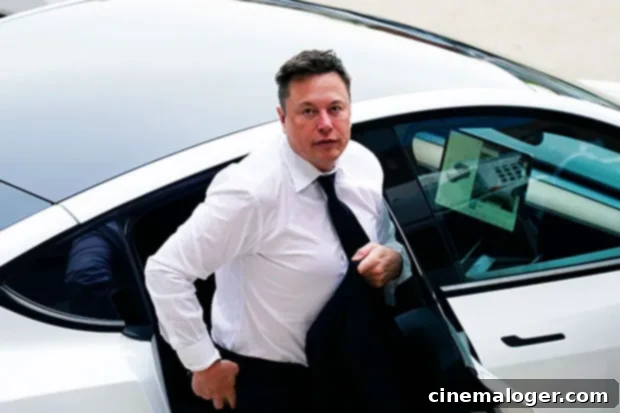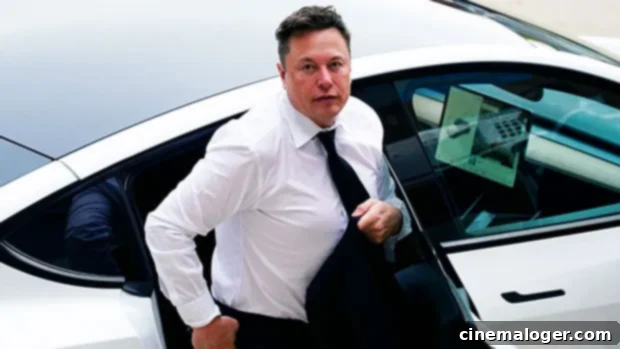Errol Musk’s Unfiltered View: A Father’s Candid Critique of Billionaire Son Elon Musk
In a startling and widely publicized interview on August 1st, Errol Musk, the father of tech magnate Elon Musk, offered a deeply personal and often critical assessment of his son. Speaking on Australia’s Kyle & Jackie O radio show, Errol Musk did not shy away from expressing his unvarnished opinions, delivering a series of statements that ranged from surprising to seemingly harsh, especially when directed at one of the world’s most prominent billionaires. The interview quickly garnered significant attention, shedding light on a complex father-son dynamic that exists far removed from the public image of the SpaceX and Tesla CEO.
The candid conversation began with a direct question regarding whether Errol was proud of his 50-year-old son, Elon Musk. His response was unequivocally “no.” While acknowledging that the Tesla CEO has undeniably “surpassed the mark” in his illustrious career, Errol quickly contextualized this by emphasizing the extensive accomplishments of the entire Musk family. According to Errol, their family’s history is steeped in significant achievements across various fields, suggesting that Elon’s success, while remarkable, is simply a continuation of a long-standing legacy of high-achievers. This perspective suggests a unique familial standard, where even monumental global success might not elicit a specific sense of ‘pride’ but rather be viewed as an expectation met or a natural outcome.
“We are a family that have been doing a lot of things for a long time,” Errol explained during the interview, reinforcing his stance. “It’s not as though we suddenly started doing something.” This statement implies that the Musk family operates on a different wavelength when it comes to measuring success and expressing paternal admiration. For Errol, it appears that individual accomplishments, no matter how grand, are perceived through the lens of a collective family history of excellence, potentially setting an incredibly high bar for any single member. This familial narrative offers a rare glimpse into the psyche of the Musk patriarch and the environment in which Elon was raised.

A Sibling Comparison: Kimbal Musk as the “Pride and Joy”
Perhaps the most pointed comment, and one that quickly circulated across headlines, was Errol’s declaration that Elon’s brother, Kimbal Musk, is his “pride and joy.” This statement, delivered without apparent hesitation, cast an immediate shadow over Elon’s widely celebrated achievements. Kimbal Musk, a prominent restaurateur, chef, and entrepreneur focused on sustainable food systems, has built a significant career in his own right, often operating with a lower public profile than his younger brother. Errol’s explicit favoritism, even if delivered in jest or as a provocative remark, highlights a complex sibling dynamic and raises questions about the expectations and perceptions within the Musk family. For a father to publicly elevate one son over another, particularly when one is a global icon, is an uncommon and striking revelation.
This comparison naturally sparked considerable public discussion about sibling rivalry and the pressures of living up to family expectations. While Elon is synonymous with futuristic technology and space exploration, Kimbal’s work, centered on community and healthy eating, represents a different kind of impact. Errol’s comment suggests a potential preference for, or a deeper connection with, Kimbal’s chosen path and lifestyle, further complicating the narrative of the ‘successful’ Musk sons. It prompts observers to consider what criteria Errol might value most in his children, beyond the accumulation of wealth or technological advancement.
Physical Appearance Under Scrutiny: Elon’s Health and Diet
The interview also ventured into surprisingly personal territory when Errol commented on recent photos of Elon shirtless during a vacation in Greece. These images, which had already circulated widely online, depicted Elon in a relaxed, candid manner. Errol’s take on his son’s physique was blunt: “Elon is very strongly built but he’s been eating badly.” He didn’t stop there, going so far as to urge Elon to consider taking a weight loss supplement. Such a public critique of a son’s physical appearance, especially from a father, is highly unusual and adds another layer to the interview’s controversial nature.
This commentary on Elon’s body and diet underscores the immense public scrutiny that figures of his stature endure. Every aspect of their lives, from their business decisions to their personal appearance, becomes fodder for public consumption and discussion. Errol’s remarks, however, carry a different weight, coming from an intimate family member. It highlights a common parental concern for a child’s health, albeit expressed in a very public and perhaps insensitive manner. This particular segment of the interview sparked discussions about body shaming, parental boundaries, and the appropriateness of such advice being aired on a national radio show, particularly when the subject is under constant media observation.
The Ambitious Scion’s Internal Clock: Elon’s Self-Perceived Delays
Beyond personal critiques, Errol also offered insights into Elon’s internal world regarding his career aspirations. During the 20-minute discussion, he claimed that Elon himself isn’t entirely satisfied with his current standing. “[He] feels like he’s behind schedule,” Errol asserted. “Where he is now, he would have liked to have been there five years ago. He is frustrated with his progress and it’s understandable. I know it sounds crazy but we tend to think like that as a family.” This revelation paints a picture of Elon as relentlessly driven, even by his own standards, which are clearly exceptionally high.
This familial perspective on progress helps contextualize Elon’s frequently aggressive timelines for his companies, whether it’s colonizing Mars with SpaceX, revolutionizing transportation with Tesla, or merging human and artificial intelligence with Neuralink. The idea that someone who has achieved so much, so quickly, could still feel “behind schedule” is a testament to the extraordinary ambition that seems to permeate the Musk family’s DNA. It suggests that for them, success is not merely about reaching milestones, but about accelerating humanity’s progress at an unprecedented pace. This internal pressure, as described by Errol, offers a rare glimpse into the psychological drivers behind Elon Musk’s relentless pursuit of innovation, explaining why even his monumental achievements are viewed as mere steps on a much longer, more ambitious journey.
The notion of feeling “behind schedule” is particularly profound when considering the scale of Elon Musk’s endeavors. Projects like building reusable rockets, developing fully autonomous vehicles, and establishing a human colony on Mars are inherently complex and fraught with unforeseen challenges. For someone operating with such visionary goals, any delay, no matter how minor in the grand scheme, could be perceived as a significant setback against an internal clock ticking towards a future he envisions. This reveals not just Elon’s immense ambition, but also a potential source of constant pressure and self-criticism, traits that perhaps characterize the Musk family’s approach to life and achievement.
A Complex Family Tapestry: The Musk Dynasty
The interview inadvertently provided a broader context into the Musk family’s background, highlighting the complex relationships and significant achievements of its members. Elon’s parents, Errol and Maye Musk, divorced in 1979. Beyond Elon and Kimbal, they also share a daughter, Tosca Musk, who is a successful filmmaker and producer, known for her work in the entertainment industry, particularly in romance films. This demonstrates that entrepreneurial and creative drive is not exclusive to the male members of the family but is a pervasive trait across the Musk siblings.
Errol Musk’s own personal life has also been a subject of public interest, particularly his two children with his stepdaughter, Jana Bezuidenhout. This aspect of his personal life has drawn considerable media attention and adds another layer of complexity to the family’s public narrative, showcasing the unconventional nature of some of their familial arrangements.
Meanwhile, Elon Musk’s personal life, particularly his relationships and prolific fatherhood, is equally rich with details that often make headlines. He has been married twice, first to Justine Wilson and then to Tallulah Riley. His marriage to Justine lasted until 2008, while his relationship with Tallulah involved two separate marriages, from 2010 to 2012, and again from 2013 to 2016. Elon has a significant number of children, a fact he has openly discussed. He shares five children (twins and triplets) with Justine Wilson, two children with his former girlfriend, musician Grimes, and recently confirmed the birth of twins with Shivon Zilis, a top executive at his brain-chip company, Neuralink. This extensive family, encompassing multiple relationships and numerous children, highlights the intricate personal life of a man whose professional endeavors are already reshaping the future.
The Dynamics of Public Scrutiny and Family Relations
The Errol Musk interview serves as a stark reminder of the unique challenges faced by public figures and their families. When a family member, particularly a parent, offers such unfiltered and critical views on a global icon like Elon Musk, it inevitably transforms private family dynamics into public discourse. Radio shows like Kyle & Jackie O are renowned for their provocative and candid interviews, often seeking out sensational content that resonates with a broad audience. Errol Musk’s willingness to participate and speak so openly about his son suggests either a desire to offer a different perspective on Elon, a lack of concern for public perception, or perhaps a combination of both.
The public’s reaction to the interview was predictably diverse. While some criticized Errol for what they perceived as insensitive and unsupportive comments, others found his honesty refreshing and insightful, offering a humanizing look into the life of a man often seen as larger than life. The concept of a parent not being “proud” of a hugely successful child struck many as counterintuitive, prompting contemplation on the varying definitions of success and parental approval. This incident highlights the universal themes of father-son relationships, expectations, and the complexities that arise when one family member achieves unprecedented fame and fortune.
Ultimately, Errol Musk’s interview provides a rare and intriguing glimpse into the private world of one of the planet’s most influential families. It underscores that behind the headlines of technological innovation and multi-billion-dollar ventures, there remain deeply human stories of family dynamics, personal aspirations, and the challenging interplay between public persona and private sentiment. For Elon Musk, accustomed to public praise and criticism for his business ventures, this direct and unfiltered assessment from his own father adds a profoundly personal dimension to his public narrative.
